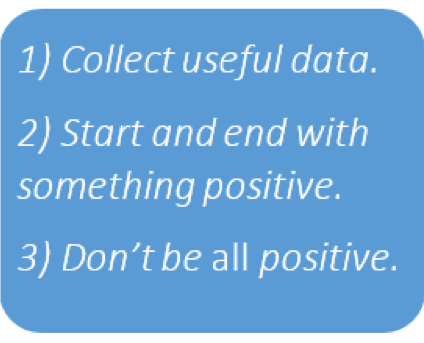
AEA365 Curator note: Back in January, AEA365 readers asked to read about how evaluators deliver negative findings to clients and stakeholders. This week, we feature 5 articles with four evaluator perspectives on this topic.
Greetings! I’m Bernadette Wright, founder of Meaningful Evidence. We help nonprofits to leverage research to tackle complex issues. Being in the public speaking organization Toastmasters taught me a few useful tips for presenting negative (and positive) evaluation findings. You can even use these techniques for giving feedback to friends, family members, and co-workers!
Collect useful data.
To give a useful evaluation, you need to start by collecting useful data.
In Toastmasters, evaluators plan ahead by reading the speaker’s speech manual to understand the purpose of the speech. Is it to persuade, to entertain, to inform? You can also talk with the speaker to find out their personal goals for their speech.
Similarly, planning a useful evaluation first requires learning about the program. Read the program materials, review the literature, and ask stakeholders how they plan to use evaluation results. That lets you shape your evaluation strategies to fit the purpose.
Start and end with something positive.
In Toastmasters, no matter how much work a speech might need, you always want to start and end your evaluation with something positive and specific (the “sandwich” technique). That lets the speaker know what to keep or do more of. It also gives them encouragement to try again.
For example, you might start with, “I loved the expression in your voice—I felt the emotion!” You might close with, “By making that change, I feel your speech will be highly entertaining. I look forward to your next speech!”
In delivering evaluation results, I always like to start and end with something that went well. It could be the progress made in carrying out planned activities, the strategies that were most beneficial, or the positive effects that were found. That lets program directors know what to keep or expand. It also gives them encouragement to incorporate your evaluation findings to increase their program’s success.
Don’t be all positive.
In Toastmasters, even the most polished speakers are always looking to get better. If a speaker hears nothing but praise, they might wonder whether going to meetings is worth the time. Evaluators are challenged to find at least one small idea for improvement in every speech. It may be as minor as changing a word here or adding a longer pause there.
In evaluation, when a manager wants to maximize their program’s potential, they might feel they’re not getting their money’s worth if an evaluation is nothing but praise. So, always include ideas on how to do even better.
Rad Resource:
You can download Toastmasters International’s guide on “Effective Evaluation” in the Resource Library on their website.
Rad Resource:
If you are interested in learning more about Toastmasters, you can find a club near you to visit.
Do you have questions, concerns, kudos, or content to extend this aea365 contribution? Please add them in the comments section for this post on the aea365 webpage so that we may enrich our community of practice. Would you like to submit an aea365 Tip? Please send a note of interest to aea365@eval.org. aea365 is sponsored by the American Evaluation Association and provides a Tip-a-Day by and for evaluators.
